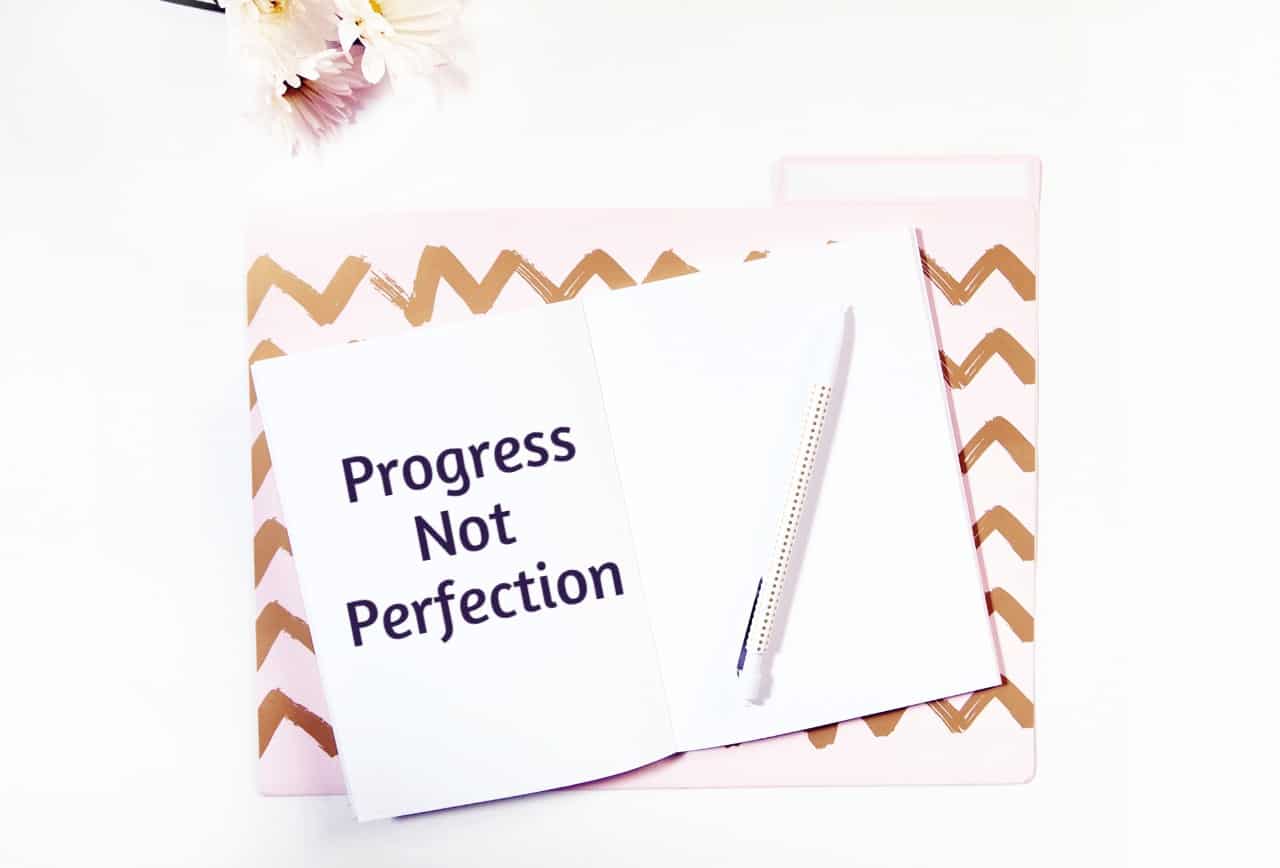
This post contains affiliate link(s). An affiliate link means at no extra cost to you, I earn a commission if you make a purchase through my link. It helps support my website which I genuinely appreciate.
What does successful goal setting and planning mean to you?
Not sure? How do you set and plan goals?
For some moms, it looks like this…
Write a list of goals, dream, set it aside and forget about it for a while.
After a few weeks remind yourself of the goals you want to achieve but feel bad because you haven’t started, set it aside out of guilt.
Goals to the back burner, again. Rinse and repeat.
Does this sound familiar?
It’s a common cycle to get trapped in. I know because I was there, but for me it wasn’t just forgetting. There were other factors within my control that impeded achieving my goals.
Other reasons you might struggle with following through on your goals:
- You’re winging it
- You’re caught in perfectionism
- You’re setting too many goals you can handle
- Fear of failure
- You dream but don’t do
- You’re setting someone else’s goals
- You set negative goals
- You struggle to focus
- You give up too soon
Goal setting and planning is not easy. It’s a process that takes time and effort.
That doesn’t mean you should give up. I have 7 helpful tips to help prepare you for goal setting so that over time setting and planning goals will never be overwhelming.

Let Go of New Year’s Resolutions
Resolutions are vague. We want to lose weight, get a better job, or eat healthier, but we don’t sit down and build an action plan to achieve those goals. Saying you want to do those things are not the same as doing those things.
There are a few problems with setting resolutions in January. It’s vague, unrealistic, or it’s a resolution for someone else, not you.
This goes back to the problem I mentioned earlier. Setting someone else’s goal will never propel you forward. You are trying to build a life that is not yours.
Start creating goals that support you and that better you.
Goals must be important to you and should always be specific, never vague.
Getting clear will make it easier for you to break down the exact steps you need to take to follow through.
Example: You want to lose weight.
- Be specific and yourself the following questions.
- How much weight do you want to lose?
- Why do you want to lose weight?
- What do you need to get started?
- How will you fit it into your schedule?
- Is the amount of weight I want to lose realistic and healthy?
- What habits are you aware of that need to be changed?
If you want to learn a new skill, get a raise, start a business or make more time for yourself, don’t just say you’ll do these things. Take the time to figure out how you’ll get there.

Choose Your Best Method
Does the thought of goal setting and planning intimidate or excite you? Not sure?
If you’re notorious for setting goals in the new year and two weeks later it’s long forgotten, goal setting is a challenge for you. That’s okay! Most people struggle with it.
An easy and effective goal setting method is the S.M.A.R.T Method.
S.M.A.R.T goals acronym stands for Specific – Measurable – Actionable – Realistic – Time-bound.
Download my S.M.A.R.T Goals worksheet to help you get clear on your goals. There is no better time to start than now!
Going back to my question earlier about your thoughts on goal setting. What kind of goal setter are you?
There are many types of goal setters, but two stand out the most. They’re the ambitious ones and the intimidated ones.
An approach for the intimidated goal setter
Instead of that big lofty goal, break it down into something small. Small goals are not insignificant. Small goals are doable, and you are far more likely to achieve a bigger goal with mini goals. Small wins will also keep boosting your confidence when you need it.
You want to eat healthier. It’s a big goal and not very specific. Instead, break it down into bite sized chunks to make it doable.
Example: “Eat healthier” to “Cut fast food orders to 1 meal per week”
Already you know what you need to do. There is little room to revert to bad habits because you have a specific target. You’re eating will improve by doing this one “small” action.
Your chances of success are greater if it’s manageable.
An approach for the ambitious goal setter
If you’ve been goal setting for a while and it’s thrilling to deep dive into the process, tackling one big goal is doable. The thrill and excitement alone won’t guarantee success, that’s why I recommend sticking to one big goal first.
If you’re an ambitious goal setter full of dreams, and have a long list of goals you want to accomplish in the new year, hold up! Before you dive in, think about those goals and ask yourself these questions. Do all these goals matter to you? And will it improve your quality of life?
You want to enroll in a handful of skill building courses and it will be awesome. At least you think so. If you’re a busy mom, one course might be all that you can handle. It will depend on your circumstances. Setting realistic objectives will be more manageable with a busy schedule.
Example: “I will enroll in five (2 month long) skill building courses in 2020” to “I will complete one skill building course before applying for another in 2020”
For someone who’s ambitious this might disappoint but biting off more than you can chew will take a hit to your momentum and your confidence.
Tackle one big thing at a time. Finish what you started, celebrate your win and move to the next new challenge.

Set a Date
Did Christmas shopping put you in the red and now you’re on the hook for a sizable debt? You say to yourself “I’ll put X dollars towards this debt, and I should have it paid off soon”
Or…
Maybe you want to start a business. You’ve told your spouse or family member that you’ll start planning in two months.
Saying you will do something is not enough. Saying you will pay off debt or start a business is not an action plan. You need to be specific on HOW and WHEN you will pay off debt. Set a date.
Be conservative in the time it takes to achieve a goal. Underestimating how long it takes can set you up for some major disappointment. Give a little extra time for potential setbacks.
Your goal might take a month, a year, 5 years or 10 years to achieve. That’s ok.
How do you know if a goal is short-term or long-term?
A short-term goal can be accomplished in a few days or weeks. A long-term goal can be accomplished in a few months to a few years.
How long it takes depends on you. It will depend on your circumstances, urgency, drive and your commitment.
Example (Short-term): You want to learn a new skill
Maybe you want to improve your photography skills. There are many courses that you can take that don’t require a huge time commitment. Some can take as little as 30 hours to complete.
Setting a date for a short-term goal will be easier to manage and fit in your schedule provided you schedule in the time to do it.
Example (Long-term): You want to a start a home-based business in 2020
That’s a great goal to have. It’s a long-term goal so be prepared for the long haul. This one is more complex and require more of your time.
Don’t let that discourage you. If starting a business is important to you, do it! Start setting specific dates on when you will brainstorm ideas, create a plan and get the resources necessary to start your venture.
All goals, whether short or long term, are worthwhile. Setting specific dates will keep you accountable and on track.

Journals & Planners for Accountability
I love paper planners and journals because they can be your sidekick in success IF you use them daily. A study done at the Dominican University of California found that you are 42% more likely to achieve your goals if you write them down.
Proof that writing your goals on paper increases your chance of success.
Important Tip: Make your paper or digital planner VISIBLE. If not visible it’s “out of sight and out of mind” It happens to me too! Leave your paper planner or journal on your desk, counter or wherever you will see it daily.
Use your paper planner or journal to map your goals (personal and professional). Identify the What, Why, How and When of your goals as well as tracking the progress you’re making.
If you’re looking for a planner for goal setting and planning, I recommend you use Cultivate What Matters – 2020 PowerSheets Goal Planner. I received this as a birthday present and I’m so excited to deep dive into my goals for the new year.
It’s the most thorough goal planner I’ve seen, and I’ve had many in my day. If you’re looking for a goal setting and planning system, check out Cultivate What Matters 2020 PowerSheets Goal Planner. You won’t regret it!
Track Your Progress

With all goals you must track it. If you want to achieve your goals, consistency is key, and tracking will help you get there.
It’s important because success doesn’t happen overnight. It takes time to achieve goals and the habit of tracking will give you valuable insight on your progress.
Tracking is not an option, it’s essential to achieving your goals.
Another reason is motivation. Motivation fluctuates. Be prepared for the downturn in motivation and track. It’s one of the ways you can keep motivation flowing when it wanes.
You also get an opportunity to reflect on the growth you’re making too which will give you a hit of self-confidence. It provides too many benefits not to do it.
You might see that you’re not making progress. Don’t give up! You can identify your obstacles and make changes.
Think positive and have faith that you will see this through. It can be hard if you are not seeing progress.
Keep in mind that small progress is still progress, so don’t be hard on yourself.
Important tip: After reviewing your goals and your progress, you might notice a goal is just not working for you. It’s okay to let that goal go. Always try it first. If you’re following your plan but it’s still not working for you, let it go. You will spend less of your valuable time working towards something that doesn’t work for you.
You will need to review your goals often. I recommend reviewing using the Cultivate What Matters Goal Setting planner. It will give you the direction you need, help keep you accountable and motivated.

Make It A Habit
You’ve set a realistic goal, mapped out your action plan and are tracking your progress. Congrats! You are leaps ahead of many others in goal setting and planning. But you’re not out of the woods yet. You still have to maintain your efforts.
That’s where building habits becomes just as important. How do you build the habit?
You build it by doing. Using the S.M.A.R.T method for every goal and staying on top of your progress with tracking either daily or weekly.
The more you do it, the easier it gets and when it gets easier, it becomes more natural to you. When we do things naturally, it’s effortless.
Mindset is also key to building positive habits. If the language you use is negative, it will be difficult to build positive habits that result in goal success.
Avoid using “Have to” language. Instead use “Want to” language.
Example: Instead of “I have to lose weight because I look terrible in these jeans.” be positive with “I want to lose weight so I can feel better.”
Anyone can build positive habits. It takes persistence and the right attitude.

Reward Yourself
Setting goals and sticking to your plan isn’t easy. It takes work, focus and discipline.
Celebrate your wins big or small. Never forget to reward yourself.
Be sure to celebrate by doing something that doesn’t go against your goals. So, if you’re trying to make better health choices, treating yourself by overindulging on junk food is not a good way to celebrate.
However, you can enjoy a fancy meal at a quality restaurant with your significant other. You get to indulge without it derailing all your hard work.
When you reward yourself, motivation will go up and you are more likely to continue seeing success.

Setting goals should never be scary or overwhelming. Setting goals helps you get the life you want.
Many of the obstacles we face are within our control.
There will be days when you lose your ambition because life happens, and it sets you back.
Know that you are resilient!
Setbacks are temporary. It’s up to you to brush yourself off and continue focusing on your goals.
If you’re struggling…
Be clear and intentional when establishing goals. It must be important enough to you to give you the drive you need to follow through.
Review and track your progress. A habit you will build and improve on over time but essential to your success.
Start getting clear on what YOU want in your life. This is your time, make it matter!
What are your dreams for the new year and what do you struggle with the most about goal setting and planning?

GET CLEAR ON YOUR GOALS
Have a goal you just can't achieve? Are you uncertain how to achieve your goal(s) or maybe it makes you uneasy for some reason.
Sign up for my Free S.M.A.R.T. Goals Method Worksheet to help you get down to the core of what you want to accomplish for 2021 so that you can finally achieve them!
Thank you!
You have successfully joined our subscriber list.
